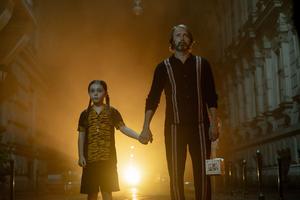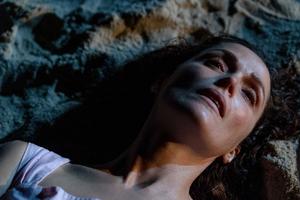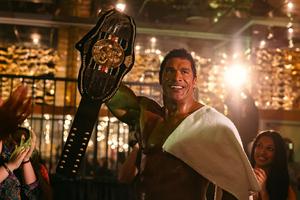Entertainment
/ArcaMax

Review: Bryan Fuller Comes Close to Making a Fantasy Classic with 'Dust Bunny'
Evicting a monster from under your bed is no longer the childhood nightmare it used to be. In scarier times, the afflicted kid might have had to appeal for parental assistance -- always the least likely source of relief -- or maybe improvise some "Home Alone"-style household armaments. In desperation, the unlucky tyke might have needed to hire a...Read more

Review: 'Left-Handed Girl' -- The Kids Are All Night
The characters at the center of "Left-Handed Girl" are like individual stations of the cross on a long road to womanhood. Little I-Jing, for example. I-Jing is 5 years old, and when we meet her she is moving to the Taiwanese capital of Taipei with her mother and older sister. I-Jing's face is like a sun and a moon at once, open and hopeful, and ...Read more

Review: 'The Carpenter's Son' or Hell on Earth
How stoked would you be to see a movie about a teenage Jesus and his creepy new friend, Satan? Especially if the cast included Nicolas Cage (although not, alas, in the Jesus role), and extra-especially if the picture were also a horror movie? How quickly would you be making a beeline for Fandango to nail down a seat for the next screening of ...Read more

Review: 'Bugonia' and their Swat team
The actual bug alluded to in the title of the new Yorgos Lanthimos movie is the humble honeybee, that tireless insect whose pollinating peregrinations keep the Earth's greenery going and grocery aisles stocked. The human characters, however, are the truly buggy ones -- they're clearly not right in the head. Well, maybe.
For example, Michelle ...Read more

Review: 'A House of Dynamite or: Do It Again
Although it's packed to the gills with fine actors -- among them Idris Elba, Rebecca Ferguson, Tracy Letts and Jared Harris -- the true star of "A House of Dynamite," the new Kathryn Bigelow movie, is the gush of tech talk and military war-speak that propels it forward, and stands in for a story. Since Bigelow is a master action filmmaker, this ...Read more

Review: 'If I Had Legs I'd Kick You" or Rose Byrne Rules!
"If I Had Legs I'd Kick You" would qualify as a horror movie if it had a monster lurking somewhere in the protagonist's house instead of inside her head. Writer-director Mary Bronstein's second feature (after a 17-year professional hiatus) has dark Lynchian visual elements and an emotional atmosphere that echoes the nerve-scraping work of the ...Read more

Review: 'The Smashing Machine' has raw power
It's understandable that "The Smashing Machine," a new movie by Benny Safdie, might put you in mind of Darren Aronofsky's great 2008 film, "The Wrestler." Unfortunately, what it most strongly recalls about that movie is its rich emotional glow, and especially its poignant lead performance by Mickey Rourke. Compared to that earlier picture, this ...Read more

Review: 'One Battle After Another' In and Out of the Past With Leonardo DiCaprio and Sean Penn
Any director hoping to arouse the action audience for a new movie might want to come up with a more kickass title than "One Battle After Another." But that's what Paul Thomas Anderson has settled on for his latest film, which is loosely adapted from Thomas Pynchon's 1990 novel "Vineland" (an even less tantalizing title possibility). The picture ...Read more

Review: 'Him' and 'A Big Bold Beautiful Journey' or tales from the Black List
The Black List is an annual movie-biz survey of unproduced screenplays that insiders believe are worthy of being bought and made into movies. Some scripts do benefit from this attention, and the process has enabled some great films -- David Fincher's "Zodiac," for instance, and Martin Scorsese's "The Wolf of Wall Street." It has given us lesser ...Read more










